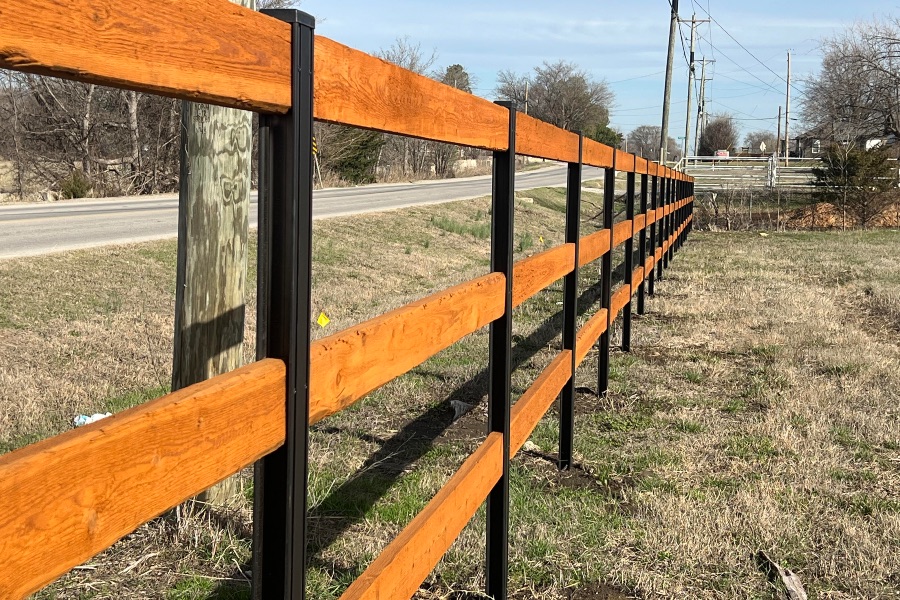All Categories
Featured
.jpg)
Selecting the appropriate fence material is vital for achieving the balance of resilience, aesthetics, and performance that suits your property. Timber, vinyl, and aluminum are preferred options, each with unique features that accommodate certain demands. Right here's a comprehensive check out the benefits and negative aspects of these 3 materials.
Wood Secure Fencing. Pros:. Classic Appeal: Wood supplies an all-natural, classic appearance that matches different building designs. Customizable: It can be painted or stained in a selection of designs and colors. Inexpensive: Wood fencings are typically less expensive upfront than vinyl or light weight aluminum. Eco-Friendly: As a renewable source, wood is lasting and biodegradable when sourced responsibly. Cons:. Maintenance-Intensive: Requires regular discoloration, paint, or securing to secure versus weather and insects. Much Shorter Lifespan: Depending on the sort of timber and climate, it commonly lasts 10-15 years. Susceptability to Damages: Prone to decomposing, warping, and termite damages without proper treatment. Timber is perfect for property owners who value aesthetic appeals and agree to spend effort and time in upkeep to lengthen its life.
Plastic Fence. Pros:. Sturdy: Immune to bugs, rot, and weather, vinyl keeps its structure in extreme problems. Low Upkeep: Needs little upkeep past occasional cleaning. Lengthy Life-span: Vinyl can last 20-30 years without substantial wear or damages. Functional Layouts: Readily available in various colors, textures, and designs, including choices that imitate timber. Cons:. Costly Installation: Vinyl fences are more pricey to install contrasted to wood. Brittle in Winter: Plastic can fracture in severe cool climates. Challenging to Repair service: If harmed, entire sections may require replacement, which can be testing to match. Vinyl fence is a wonderful option for those focusing on durability and marginal upkeep, even if it comes with a higher in advance price.

Aluminum Secure Fencing. Pros:. Rust-Resistant: Light weight aluminum does not rust, making it perfect for moist or damp locations. Light-weight yet Solid: Deals stamina without being overly hefty, which streamlines installation. Low Upkeep: Calls for little bit greater than cleaning and periodic repainting. Long life: Aluminum fences can last for decades without significant wear and tear. Stylish Designs: Commonly made use of for attractive objectives, light weight aluminum adds refinement to any building. Cons:. High Preliminary Price: Light weight aluminum fencings are among the extra pricey options. Restricted Personal privacy: Often created with open areas, they do not obstruct sights or sound. Susceptible to Dents: While sturdy, light weight aluminum can be dented or bent with hefty effect. Aluminum is best suited for those that desire a lasting, trendy fencing and don't need total personal privacy.
Making the Right Selection. Each material has its strengths and weaknesses:

Timber is best for traditional visual appeals and eco-conscious customers who don't mind maintenance. Plastic works for homeowners seeking a weather-resistant, low-maintenance option. Aluminum is a durable, decorative alternative for those that want elegance and durability. Consider your top priorities-- whether it's cost, look, personal privacy, or upkeep-- and consult a fence specialist to choose the material that best satisfies your needs. A well-selected fence will certainly improve your property for several years to find.
Latest Posts
Protect Your Home with Top Quality Residential Roofing
Published en
1 min read
Don’t Miss Special Auto Repair Offers in Chicago at Montclare Auto Repair
Published en
1 min read
Find Brake Repair & More: Comprehensive Services Guide from Montclare Auto Repair
Published en
1 min read
More
Latest Posts
Protect Your Home with Top Quality Residential Roofing
Published May 23, 25
1 min read
Don’t Miss Special Auto Repair Offers in Chicago at Montclare Auto Repair
Published May 23, 25
1 min read
Find Brake Repair & More: Comprehensive Services Guide from Montclare Auto Repair
Published May 22, 25
1 min read